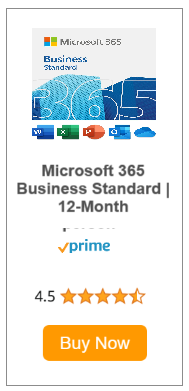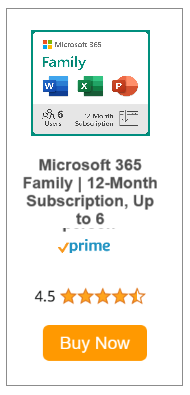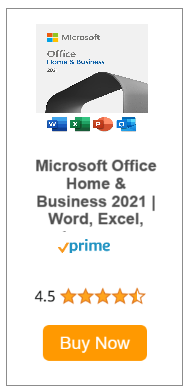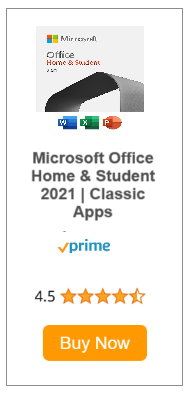Microsoft 365 Business Standard
Microsoft 365 Business Standard
Microsoft 365 Business Standard | 12-Month Subscription, 1 person | Word, Excel, PowerPoint, Outlook, OneDrive | 1TB OneDrive Cloud Storage | PC/Mac Instant Download
Microsoft Office 365 Business
Microsoft 365 Business is an integrated solution, bringing together the best-in-class productivity of Office 365 with advanced security and device management capabilities to help safeguard your business.
Microsoft 365 Business Standard is the most feature-rich email hosting provider we've tested, which stands to reason seeing as how it's been around such a long time. The service makes domain and email setup easy for any sized business and has lots of migration and importing tools if you're coming from another platform.
Local and web versions of the full Microsoft Office suite are included, as well as access to Microsoft's more advanced tools like SharePoint and Intune for device management. You can also purchase a wide variety of add-on services, such as Microsoft 365 Business Voice, and these offerings are available from Microsoft or its large partner ecosystem. It may be more expensive, but for its feature list alone, it's an obvious Editors' Choice winner.

The service starts at $20 per user per month. That can add up quickly for larger organizations, but as mentioned its encyclopedic list of features makes the money worthwhile. Business Premium also has generous bedrock features at that price, which include 50GB of email hosting and 1TB of Microsoft OneDrive cloud storage in addition to domain hosting. That's an excellent overall list, though our other Editors' Choice pick, Google Workspace Business Standard, leads the pack with a whopping 2TB of mailbox storage.
More attractive to most businesses, especially in the new and distributed hybrid work model, is that you get an Office 365 subscription as part of the package for every user which includes Microsoft Teams and SharePoint Online hosting. What you won't get is the perpetual on-prem license version of Office, which Microsoft recently dubbed Office LTSC.
You will, however, get a bundled Intune subscription, which handles device management, so you'll be able to enforce hardware policies for home BYOD scenarios, which is something no other email hosting competitor offers right now.

You'll also get two forms of additional security. First is Microsoft Azure Information Protection (AIP). This is a content classification app that lets you tag documents with different classifications and assign varying levels of protection and access to them based on those tags. The second security measure is Microsoft Defender for 365. It's a 365-optimized version of the Microsoft Defender Security platform that provides antivirus and malware protection to data and endpoints. Microsoft hasn't pulled any punches, and you can try the service free for one month by visiting the company's website. For the money, the Business Premium tier will likely be the most popular purchase for most businesses.
Compared to other document editing suites, Google Workspace Business Standard, Microsoft 365 Business Premium is certainly more costly, especially since Google provides such massive mailbox storage for just $12 per user per month for its Standard tier. However, Google's bundled apps aren't nearly as comprehensive as Microsoft's, especially for data, user, and device management. It may cost more, but Microsoft 365 is still the more powerful platform.
As with any email hosting service, getting set up is often the hardest part. However, Microsoft has done a nice job of cutting through the traditionally cumbersome parts because it uses a guided setup process. It walks you through all of the major steps, such as downloading Office to every client, adding your domain name (including the option to migrate from another host), setting up Teams, and then enabling data loss prevention (DLP), which protects against anyone leaking your sensitive data. As a final step, you can configure protection for mobile app users by enabling data encryption and enforcing things such as re-authentication after a certain number of minutes.

Collaboration in Microsoft 365 Business Premium is essentially about Microsoft Office combined with Teams, OneDrive, and SharePoint. If you've used these apps separately, you'll love how they work together here. As far as the email client goes, the heart of the user experience is, of course, Microsoft Outlook.
Most users have some experience with Outlook on the desktop, but with 365 Business, the really exciting stuff is happening in the web client. A recent addition, Microsoft Editor, is Microsoft's answer to Grammarly. It works across all the apps in the Office suite, but only on the web side. There's another handy feature that lets you quickly add files related to a conversation thread without having to go and search for the thread. Currently, this only works on OneDrive documents, but it's nice to have if you happen to be using the web client.
If we have a gripe with Microsoft 365, here it is: A web client should work across any browser, but Microsoft has really only focused on Windows and macOS. If you try and use a Microsoft 365 Office web app via a Linux browser, you'll almost certainly experience compatibility problems. Yes, the apps are usable overall, but you get a much smoother experience on the two commercial operating systems. Hopefully, this will change now that Microsoft is working to better integrate Linux with Windows.

Even considering only the commercial operating systems, macOS is still noticeably behind Windows when it comes to how Outlook functions. Organization and advanced features are definitely lagging, which really shouldn't be the case anymore. Microsoft has also focused more on advancing its web version of Office than the desktop equivalents.
SharePoint is another Microsoft 365 component that's probably underutilized by most customers because getting it up and running can be overwhelming. But if you need a centralized location to organize, plan, and collaborate on documents with change management enabled, this is the way to do it. It's also got task and workflow management, so it can be a little difficult to decide where to start, and you may need IT's help, but once you've got a plan for using SharePoint, other functionality will grow organically.
If maintaining regulatory compliance is part of your job, know that Microsoft has data centers distributed across the U.S. and Northern Europe. All of them have undergone SOC auditing and achieved SOC 1 Type2, SOC 2, and SOC 3 compliance status. And if you've got a HIPPA Business Associate Agreement (BAA) in place, the service will cover HIPAA for you, too.

Our Verdict
It's pricey, but Microsoft 365's combination of domain hosting, easy administration, security, and its industry-leading productivity suite keeps it at the top of the email hosting heap.
 Micro Tools Reviews
Micro Tools Reviews
Useful Link
Disclaimer
microtoolsreviews.live is a participant of the Amazon Services LLC Associates Program, an affiliate advertising program which is designed to provide an aid for the websites in earning an advertisement fees by means of advertising and linking to Amazon products.













